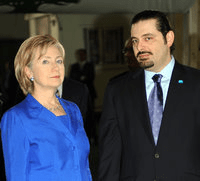Since coming to office, the Obama administration has paid a great deal of attention to the Middle East. Somehow, however, the frequently turbulent country of Lebanon slid precipitously down the list of Washington's most-urgent regional priorities. Among the other strategic projects on its regional to-do list, Washington was working to engage with Syria, bring Israelis and Palestinians to the negotiating table, improve relations with Muslims, impose sanctions on Iran, and end the war in Iraq. Lebanon, perhaps unsurprisingly, got short shrift, even though it has always played an outsized role in the region, serving as the stage where powerful players have engaged proxies to fight their battles.
But then, in the last few days and weeks, something happened. Amid warnings that Lebanon could soon face another civil war, or perhaps a coup d'état by Hezbollah, a worried Washington rediscovered the country. After all, a bad turn of events there could easily derail Washington's other plans.
Suddenly, the State Department has become intensely preoccupied with Lebanon. America's Lebanese allies, who for a time seemed secondary in the U.S. strategic vision for the region, are receiving phone calls from top administration officials, complete with reassurances of undying loyalty. The public show of support for America's friends in Beirut has been backed up with thinly veiled threats against their Hezbollah rivals, delivered via the Lebanese press to ensure the intended audience gets the message. It is a striking turn of events after months of acting as if Lebanon mattered little.

